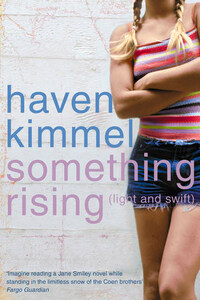The man standing across from Cassie had nearly a thousand dollars on the line and a pale absence where his wedding ring should have been. He registered on her periphery: his anger, his receding hairline, the slick shirt, the way he leaned against the corner pocket so that she had to look directly at him as she studied the shot. Cassie noticed these things without thought, the same way she could see Uncle Bud behind the bar, drying glasses and keeping his eye on her, without looking in his direction.
The man had left a mess on the table. Cassie paced, dropped her stick up and down on the toe of her boot. On the break he had sunk the six and the two and had cleared the one and three quickly. But he left the four stranded close to the rail and the cue ball downtable, taking a safety. Cassie had to do many things at onceâget to the four; sink the four; position the cue ball to take the recalcitrant five; get back down for the seven; release the eight from where it was stranded; and sink the nineâbut the whole process felt like one thing, the way walking doesnât feel like a thousand articulated events. Just one event.
Some nights she saw the table as a plane, all four sides extending infinitely, and at those times she couldnât lose. But on other nights, and against opponents like her current one (the Lounge Singer, sheâd dubbed him), she fell to earth and used what she could find there. The table was actual and massive, and its borders were discrete. She imagined two protractors joined at the horizontal line, forming a perfect circle, and everything outside that circle was darkness, and all she needed to know was inside. From the ball to the pocket was one side of an angle; from the cue ball to the object ball was the other side. And there, invisible, where the cue and the object met, or would meet: the vertex, her desire. She dreamed sometimes that her whole life was funneled into that point of contact and could be measured in the old ways: acute, right, obtuse, a reflex.
The man across the table had had too much to drink, had bet too much money, and was now showing her his black edge. It was just a look around his eyes, a flush of throat. He thought sheâd never take the four, and he was terrified she would. Cassie stopped behind the cue ball, imagined the table flipped into a mirror image, and considered a bank shot. After sheâd done her best with angles, the rest was physics. Distance, velocity, and acceleration. The transfer of momentum. And something else: a sensation sheâd never understood that caused her throat to close and her heart to pound. She was addicted to the feeling, even though it arrived like heartbreak, with the same thunder and autonomy. The four was too far away, but if she kept her eye on what her opponent couldnât see, the bisections and intersecting lines, the ghosts, she believed she could do it.
She bent so far at the waist that her chin rested on top of the cue, and the lines on the table shifted like a computer design in a war room. The two practice strokes rubbed lightly against the underside of her chin, where she was developing a permanent red line. On the third stroke, a medium shot, the cue ball traveled the length of the table; the Lounge Singer opened his mouth, closed it again. He hadnât expected the backspin, the way the bank happened so fast, sending the four right past the eight and into the corner pocket without a sigh of resistance. The cue ball rolled and stopped six inches from the five, and then it was over. The five, the seven, the eight. She sank the nine lightly, stepped away from the table, and rocked her head from side to side. Her shoulders ached.
Her opponent started to say something, but Uncle Bud filled the doorway like a piece of furniture. âPay her,â he said.
The man reached into his pocket, shaking from the loss, and pulled out a stack of bills held together with a tarnished old clip. His waistband was sweat-stained, and now that sheâd beaten him, Cassie had to tum away from seeing him too closely. She took the money, said thanks. He slipped out past Uncle Bud without a word, past the players at the other tables, the regulars who came late and stayed late and seemed to pay attention to no one.
Cassie unscrewed the butt of her cue from the shaft, wiped it down, and put the two parts away as Bud gathered the balls and brushed the felt on the table. When she was ready to go, he walked her to the back door and watched her wheel her bike down the back stairs.









